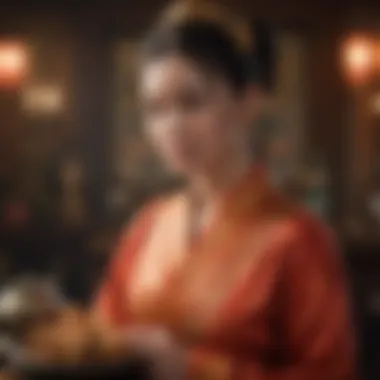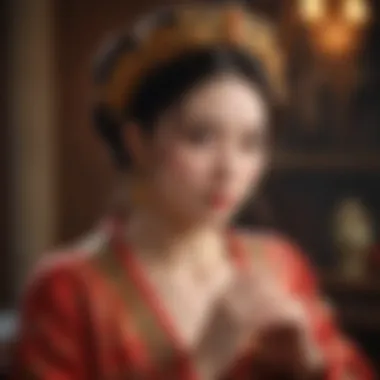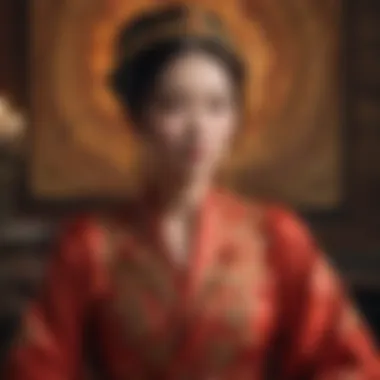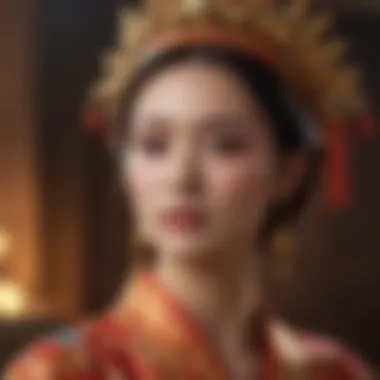Chinese Calendar Insights on Pregnancy and Family Planning


Intro
The dynamics between the Chinese calendar and pregnancy is not just a topic for academic discourse—it resonates deeply within cultural contexts around the world. For many, the lunar calendar isn't simply a means of marking time but a window into spiritual and astrological insights that can shape family planning and childbirth decisions. At the heart of the Chinese calendar are age-old traditions and beliefs that explore how timing can influence a child's personality and destiny. This exploration aims to shed light on these cultural nuances, providing a richer understanding of how the old and new intersect for expectant families.
Zodiac Sign Overview
In the realm of Chinese astrology, the zodiac signs play a pivotal role. Each sign is associated with certain traits, elements, and modalities that supposedly direct the paths of individuals born under their influence. Understanding this framework can guide parents in considering favorable birth dates based on the child's prospective zodiac sign.
General Traits
Each zodiac sign in the Chinese system—there are twelve of them—carries its own personality traits. For instance, children born in the Year of the Rat might embody characteristics like intelligence and agility, while those born in the Year of the Dog may showcase loyalty and compassion. The expectations set by these signs can impact parental choices as they consider the timing of conception and delivery.
Element and Modality
Chinese astrology links each zodiac sign with one of five elements: Wood, Fire, Earth, Metal, and Water. These elements, in conjunction with the modalities of Yin and Yang, contribute to the overall temperament and vibrant energy associated with each sign. The interplay between these factors can lead to deeper interpretations of how children born in specific periods will interact with the world around them.
Strengths and Weaknesses
It’s essential to acknowledge not just the strengths associated with each sign but their weaknesses too. While a child born under the sign of the Tiger may exude confidence, they might also struggle with impulsiveness. Expectant parents often ponder these intricacies when planning for the ideal time to welcome a new life. Is it better to align births to a year that favors courage and ambition, or one that encourages stability and patience?
"The Chinese calendar offers a rich tapestry of possibilities, presenting expectant parents a unique viewpoint on timing that intertwines with cultural beliefs and astrological insights."
The Chinese Calendar: A Foundation
The Chinese calendar stands as a testament to millennia of cultural evolution, weaving its way through the fabric of Chinese life. It isn't just a system for keeping track of days; it's a framework that influences agricultural practices, festive celebrations, and even personal milestones like marriage and childbirth. To understand its relevance today, particularly in the context of pregnancy, we must delve into its historical roots, structural nuances, and cultural significance that permeate throughout Chinese society.
Historical Context of the Chinese Calendar
The origins of the Chinese calendar date back to ancient dynasties, predominantly influenced by lunar phases. Initial recordings can be traced back to the Shang dynasty (1600-1046 BC) where astronomical observations played a crucial role. Over the centuries, the calendar adapted, oscillating between solar and lunar measurements. By the time of the Han dynasty, the lunisolar system was solidified, establishing a cycle that balances months based on the moon, while the year aligns with the sun's orbit. This harmony didn’t just serve practical functions; it also wove spirituality into the timing of ceremonies and rites of passage, especially those surrounding pregnancy and childbirth.
Structure of the Lunar Calendar
At the core of the Chinese calendar is its distinctive lunisolar structure. The months rotate around the moon’s cycles, with each month consisting of either 29 or 30 days. This inconsistency can lead to a year that expresses either 354 or 384 days. To counteract this discrepancy, a leap month is periodically added— an innovation that ensures the calendar remains in sync with the seasons.
Moreover, the Chinese calendar comprises twelve zodiac animals, each symbolizing distinct characteristics. Couples often consult these zodiac months when planning for a child, believing specific years may confer traits they desire in their offspring. This lunar approach provides a novel lens through which to consider family planning, urging people to think about timing not just in terms of months, but also in terms of cosmic energies.
Cultural Significance in Chinese Society
The relevance of the Chinese calendar transcends mere days and months; it embodies a rich tapestry of cultural beliefs and traditions. Festivals like the Lunar New Year depend heavily on this calendar, bringing communities together in celebration. Pregnancy, in particular, takes on a particularly sacred dimension within this framework. Many traditional Chinese families uphold customs that dictate when to conceive, aligning it with auspicious dates believed to confer blessings and success.
"In Chinese culture, giving birth under a favorable lunar sign can significantly impact an individual's fate and life path, shaping their identity from an early age."
Expecting mothers might partake in unique rituals or follow specific dietary customs, all influenced by calendar insights, creating a layered cultural experience around the journey of pregnancy. In summary, the Chinese calendar serves not simply as a dating system but as a cultural compass that guides familial decisions and captures the essence of societal values.
As we look deeper into how this ancient calendar interacts with modern perspectives, particularly in pregnancy and family planning, we peel back layers of wisdom that remain remarkably relevant today.


Pregnancy in Chinese Culture
Pregnancy holds a significant position in Chinese culture, intricately woven into ancient traditions and modern practices. The Chinese view pregnancy not just as a physiological process but as a profound experience that symbolizes cosmic events. This perspective has manifested in various beliefs, customs, and rituals surrounding conception and childbirth, reflecting both a reverence for life and an understanding of the universe's influence on personal destiny.
Traditional Elements in Chinese pregnancy beliefs encompass a multitude of practices that are deeply rooted in the lunar calendar's cycles. Expecting parents often look to the calendar to identify auspicious days for conception and childbirth. Various customs, such as specific dietary restrictions or rituals performed during certain lunar phases, have emerged over centuries, attempting to align the phases of the moon with the hormonal changes in a woman's body. The influence of these traditions highlights not only the spiritual connection to childbirth but also the practical considerations they provide in navigating pregnancy.
Benefits of Understanding These Traditions include fostering a deeper connection to the lineage, strengthening family bonds, and promoting a supportive environment for the child’s growth. Parents who embrace these ancient beliefs often find comfort in aligning their family goals with the rhythms of nature. The community aspect of these practices cannot be overstated; family and friends often rally together in support of the expectant mother, reinforcing social ties that can ease the transition into motherhood.
However, there are considerations to keep in mind when examining these cultural beliefs. Not all modern families may subscribe to or fully comprehend the intricate rituals linked to pregnancy. Some may find these traditions somewhat burdensome or inapplicable to their contemporary lives. Yet, even in skepticism, many see value in the slower, more reflective pace that these customs encourage.
Traditional Beliefs and Practices
The tapestry of traditional beliefs surrounding pregnancy extends back several millennia. Ancestors imparted wisdom through oral traditions and written texts, ensuring that generations understood the critical phases of pregnancy. For example, ancient texts often include detailed descriptions of the ideal conditions for a child’s conception, such as the best months of the lunar calendar to try for a baby.
In many families, special ceremonies are held to celebrate various stages of pregnancy. Rituals, such as offering foods that symbolize fertility—like peaches and pomegranates—are commonly observed. These gestures serve a dual purpose: nourishing the expectant mother while invoking blessings for the unborn child.
Conception According to the Lunar Calendar
The lunar calendar plays a pivotal role in determining the timing of conception. Many couples map out their efforts according to the cycle of the moon, believing that certain lunar phases enhance fertility. For instance, some couples might choose to conceive during a new moon, which symbolizes new beginnings and increased potential. This belief is rooted in the understanding that the moon influences not just tides but also human life.
Additionally, many individuals consult Chinese gender prediction charts that align a woman's age at conception and the month of conception to forecast the gender of the baby. Although the scientific validity of such practices is debatable, they hold a place of fascination and tradition within the culture.
Ancient Texts and Their Interpretations
Delving into ancient texts reveals a wealth of interpretations surrounding pregnancy that have influenced modern understanding. One notable text is the "Huangdi Neijing," or "The Inner Canon of the Yellow Emperor," which is a cornerstone of traditional Chinese medicine. This ancient manuscript outlines various aspects of health, including the significance of balance within the body during pregnancy. Such texts provide deep insights into not only physical health but also emotional and spiritual well-being during this critical time.
"Understanding traditional texts allows modern parents to respect the time-honored traditions that shape their family planning practices, potentially enriching the experience of childbirth."
Modern family life can benefit from revisiting these rich interpretations. By integrating traditional wisdom with contemporary knowledge, parents may find themselves navigating pregnancy with a sense of purpose and connection to their heritage, all while fostering a nurturing environment for their future children.
Astrology and Family Planning
Astrology has long been viewed as a guiding framework in various cultures, but in the context of family planning, it takes on a special significance. The fascination with aligning personal and familial goals with celestial movements reflects a deep-seated belief in the influence of the cosmos on earthly matters. For expectant parents, astrology may provide a lens through which they can examine the timing of conception and birth. This intersection of celestial movements and human life opens a dialogue about the benefits and considerations involved in using astrological insights for planning families.
The unique components of astrology can guide decision-making around conception and pregnancy. Parents find themselves considering the ideal astrological conditions for the arrival of their child, tapping into the energy associated with different zodiac signs and lunar cycles. Favorable alignments can be seen as opportunities or signs meant to enrich parental experiences.
Five Elements Theory in Parenting
In traditional Chinese thought, the Five Elements Theory extends beyond the realm of astrology to inform parenting philosophies. The elements—Wood, Fire, Earth, Metal, and Water—interact in ways that impact personality traits and family dynamics. Each element is associated with specific characteristics that can influence child-rearing. For example:
- Wood: Growth, flexibility, and creativity. A child born under this element may embody resilience and adaptability.
- Fire: Passion, leadership, and enthusiasm. This child may be naturally outgoing and prone to seeking adventure.
- Earth: Stability, patience, and nurturing. Often represents a grounded and responsible nature.
- Metal: Strength, discipline, and focus. Children of Metal are typically diligent and may pursue achievement earnestly.
- Water: Intuition, sensitivity, and calmness. Water children can be gentle and perceptive, often connecting with emotions deeply.
Understanding how these elements manifest helps parents tailor their approaches to nurture their children’s inherent qualities. Using this knowledge, families can create environments that cater specifically to the unique traits a child exhibits based on astrological considerations.
Zodiac Signs and Their Influence


A child's zodiac sign is believed to shape their personality and reactions to the world. Each sign carries a distinct energy that can influence how parents approach discipline, education, and socialization. For instance, parents of a Taurus child might prioritize stability and routine, while those of an adventurous Sagittarius might encourage exploration and learning through experience. The zodiac signs also guide interactions with siblings and friends.
It’s interesting to observe how different cultures perceive these signs. For instance, while Western astrology might offer different insights than Chinese zodiac perspectives, both systems emphasize the characteristics linked to each sign.
Here’s how zodiac signs can influence parenting practices:
- Taurus: Valuing consistency; adding comforts in homes.
- Gemini: Encouraging communication; flexible rules.
- Cancer: Providing emotional support; nurturing environments.
- Leo: Fostering creativity; celebrating achievements.
Parents often blend astrological insights with their parenting styles, creating a unique atmosphere that aligns with their child's astrological identity.
Aligning Family Goals with Lunar Cycles
Lunar cycles also play a pivotal role in family planning. The rhythms of the moon offer opportunities for timing conception and significant family events or rituals. Each phase of the moon is believed to influence energy levels and emotional states. For example, the new moon signifies new beginnings, making it an optimal time for parents to conceive, whereas the full moon is often associated with fullness and completion, perfect for welcoming new births.
Utilizing lunar cycles can result in enhanced familial harmony, as parents align their goals with cosmic rhythms. Understanding which lunar phases are most beneficial can help in selecting dates for important family events, be it weddings, announcements, or even naming ceremonies for newborns.
"Astrology and lunar cycles create a tapestry of possibility, weaving family dreams with celestial guidance."
By embracing these insights, families can create meaningful connections that resonate on a deeper level. Those seeking to align their aspirations with nature’s cycles find a holistic approach that respects ancient wisdom while navigating modern challenges.
Ultimately, astrology offers not just a method for planning but a profound way to connect with the universe and its influences.
Calculating Favorable Dates for Birth
The concept of calculating favorable dates for birth is not just a nuance of the Chinese calendar; it is a pivotal tradition that intertwines cultural beliefs with the personal milestones of family life. Within Chinese culture, the alignment of birth dates with the lunar calendar is believed to influence the child's character, health, and future prospects. Families often feel a profound connection to these ancient modalities, viewing them as a guiding framework that helps them navigate the complexities of pregnancy and early life.
The Role of the Chinese Zodiac
In traditional Chinese culture, the zodiac plays a crucial role in determining auspicious dates. There are twelve zodiac animals—Rat, Ox, Tiger, Rabbit, Dragon, Snake, Horse, Goat, Monkey, Rooster, Dog, and Pig—each associated with specific attributes and energies. According to these beliefs, a child born in a year governed by a particular animal is said to inherit characteristics tied to that zodiac sign.
The Chinese zodiac is more than a simple calendar ornament; it effectively functions as a cosmic diary that tracks the energetic cycles of the universe. Consequently, parents may actively seek to conceive or schedule births to coincide with the most favorable animals in the zodiac. For example, a family might prefer to have a child during the Year of the Dragon, often associated with strength and luck, as opposed to the Year of the Goat, which might not be perceived as ideal for all.
Finding Auspicious Days
Identifying auspicious days is a meticulous process, often involving consultation with lunar calendars and astrological charts. Families traditionally look for days that are considered particularly favorable based on various factors:
- Lunar Cycles: Potential parents frequently consider when the new moon occurs. It is thought that beginnings, such as births, that align with this phase can be auspicious.
- Elemental Alignments: Each day is associated with one of the Five Elements (Wood, Fire, Earth, Metal, Water). Finding a day where the element matches or supports the zodiac sign of the child enhances the auspiciousness.
- Numerology: Certain numbers are viewed as lucky in Chinese culture, and these may influence the selection of birth dates as some people might prefer dates that sum to specific numbers deemed favorable.
Coupling these considerations can lead to a thorough understanding of which days are more likely to bring about positive outcomes for both mother and child.
Common Tools and Methods Used
Families utilize a variety of methods and tools when calculating these auspicious dates. Common practices include:
- Lunar Calendars: The most essential tool, these calendars provide a wealth of information regarding lunar phases and traditional festivals that can influence childbirth decisions.
- Astrology Charts: Personal astrology charts may be drawn up based on the parents' and the child's zodiac signs to ensure harmonious elemental combinations.
- Consultation with Experts: Many families opt to consult with experienced practitioners, such as astrologers or feng shui masters, who guide them in interpreting both calendars and charts.
- Online Calculators: In modern society, technological advancements have led to the creation of online tools that help users easily find favorable birth dates based on the lunar calendar and zodiac alignments.


"The careful calculation of birth dates connects the past with the future, providing hope and guidance for families on their journey forward."
Through these methods, parents aim to not only predict what energies will influence their child’s life but also to enhance the family bond and secure brighter paths ahead. It's a blend of belief, tradition, and personal desire that illustrates the richness of the culture surrounding childbirth in Chinese history.
Modern Perspectives on the Chinese Calendar and Pregnancy
The blend of ancient wisdom and modern understanding is pivotal in the exploration of the Chinese calendar and pregnancy. With a growing number of individuals interested in holistic and cultural methods for family planning, the relevance of the lunar calendar has resurfaced in contemporary discourse. It offers not just a guidance system for significant dates but also a framework for aligning personal wishes with cosmic rhythms, which many find both intriguing and practical.
The modern appreciation of the Chinese calendar can be seen as a bridge between age-old traditions and today's medical advancements. Expecting parents now look to integrate these time-honored beliefs into their lives, garnering a unique sense of empowerment. This pursuit involves understanding specific elements such as:
- Lunar phases and fertility: Many believe that conception and birth are influenced by the lunar cycle, linking specific months and days with higher chances of favorable outcomes.
- Cultural rituals: Adaptations of traditional customs related to pregnancy and child-rearing are popular, offering a sense of connection to one's ancestry.
- Resource availability: The accessibility of tools to track lunar cycles or zodiac signs through apps has made astrology more relatable and applicable for the modern family.
Integrating Ancient Wisdom with Contemporary Practices
Integrating traditional practices with contemporary standards involves a nuanced understanding of both frameworks. Modern expectant parents often adopt the Chinese calendar’s methodology alongside medical advice to form a holistic approach to pregnancy. The practicality of this integration can look like:
- Using lunar calendars for conception planning. Couples may track their cycles with the lunar calendar to identify auspicious periods for conception. This can be tied into pre-existing medical advice to enhance their chances of pregnancy.
- Mindfulness through rituals. Many families now choose to incorporate ancient rituals into baby showers or naming ceremonies, creating a feature of personalization and a family tradition.
- Communication among generations. Involving older relatives, who may have firsthand knowledge of these traditions, fosters a dialogue that enriches family connections and educational aspects of modern parenting.
Challenges of Adapting Traditional Beliefs
While many individuals find value in the lunar calendar, certain challenges arise when attempting to adapt these traditional beliefs in a rapidly changing world. Resistance can appear from various fronts:
- Skepticism from the scientific community: Some healthcare professionals question the relevance of the lunar calendar, emphasizing that medical advancements should be the priority in family planning.
- Cultural dilution: As traditions are adapted, there might be a tendency for core meanings to be lost, resulting in weaken bonds to the original cultural significance.
- Generational gap: Younger parents might find it difficult to reconcile the wisdom passed down with their own modern lifestyles or beliefs. It is common for traditional practices to lose their importance in the fast-paced reality of contemporary life.
Psychological Implications for Expecting Parents
The psychological aspects of incorporating the Chinese calendar into pregnancy planning are profound. Engaging with these traditional methods can lead to various emotional benefits, such as:
- Enhanced connection to heritage: Expectant parents often report a deeper sense of belonging and identity when they engage with cultural practices.
- Psychological comfort: Aligning with lunar cycles may provide reassurance during a time that can be filled with anxiety and uncertainty.
- A space for reflection: The rituals surrounding conception, pregnancy, and childbirth invite contemplation and personal introspection, supporting emotional well-being.
As families navigate the complexities of modern life, the Chinese calendar serves not only as a guide for pregnancy but also as a canvas where culture meets personal aspirations.
Closure: The Intersection of Tradition and Modernity
As we draw this exploration to a close, it’s crucial to recognize how the Chinese calendar's age-old wisdom remarkably shapes contemporary family planning and pregnancy experiences. The balancing act between adhering to longstanding cultural customs and embracing modern values creates a unique framework for expectant parents, and serves to cultivate a more profound understanding of their family dynamics. The melding of these two realms offers a holistic view that can benefit individuals navigating today’s diverse landscape of beliefs and practices.
Reflecting on the Relevance of the Chinese Calendar Today
In today’s fast-paced world, one might wonder if the Chinese calendar retains its significance. The answer is a resounding yes! The calendar does more than just mark time; it provides an organized method for choosing optimal times for conception and birth, deeply rooted in tradition. More than a tool for astrology enthusiasts, it acts as a bridge connecting families to their heritage.
- Cultural Continuity: Many families still refer to the Chinese calendar when considering expansion. The calendar's cyclical nature aligns with the principles of Yin and Yang, emphasizing harmony and balance, which resonates with many expectant parents.
- A Guiding Framework: By offering guidance on auspicious days for significant life events, it acts as a preparation tool, making the journey smoother and stress-free. Parents to be often find comfort in knowing that they are following a system that has stood the test of time.
- Psychological Benefits: Embracing a system that honors one’s ancestry may evoke feelings of security and connection to the past. It can ease anxiety surrounding the uncertainties of childbirth and parenthood.
"Tradition isn’t just about looking backward; it’s a compass that guides the future, pointing us toward familiar shores in uncharted waters."
Looking Ahead: Future Implications for Family Planning
As society marches forward, it’s essential to consider how the Chinese calendar will evolve and continue to influence family planning. The interplay of tradition and modernity doesn’t have to be a zero-sum game; rather, it opens doors to novel opportunities and insights.
- Adapting to Modern Lifestyles: Young parents increasingly seek ways to integrate tradition into their busy lives. Digital applications that calculate auspicious days based on the Chinese calendar are gaining popularity, allowing for easy access and practicality.
- Global Perspective: As cross-cultural exchanges become the norm, we may see a blend of various traditions. This could lead to new interpretations of the Chinese calendar, making it more relatable for diverse audiences.
- Holistic Integration: Future family planning may increasingly blend ancient wisdom with contemporary psychological practices. Workshops that teach the significance of lunar cycles alongside modern parenting techniques could emerge, bridging gaps between old and new.
In essence, the Chinese calendar lays down a rich tapestry of history and culture. Exploring its relevance and impact on pregnancy challenges us to consider how to honor our roots while ensuring we stay flexible enough to embrace the winds of change.







